This post may contain affiliate links. Please read my privacy policy.
Dongpo Pork, or Chinese Braised Pork Belly, is a delicious dish that’s all about rich, savory flavors and tender, melt-in-your-mouth goodness. My easy recipe slow-cooks it in a blend of soy sauce and rice wine, making it a must-try for any pork belly lover!
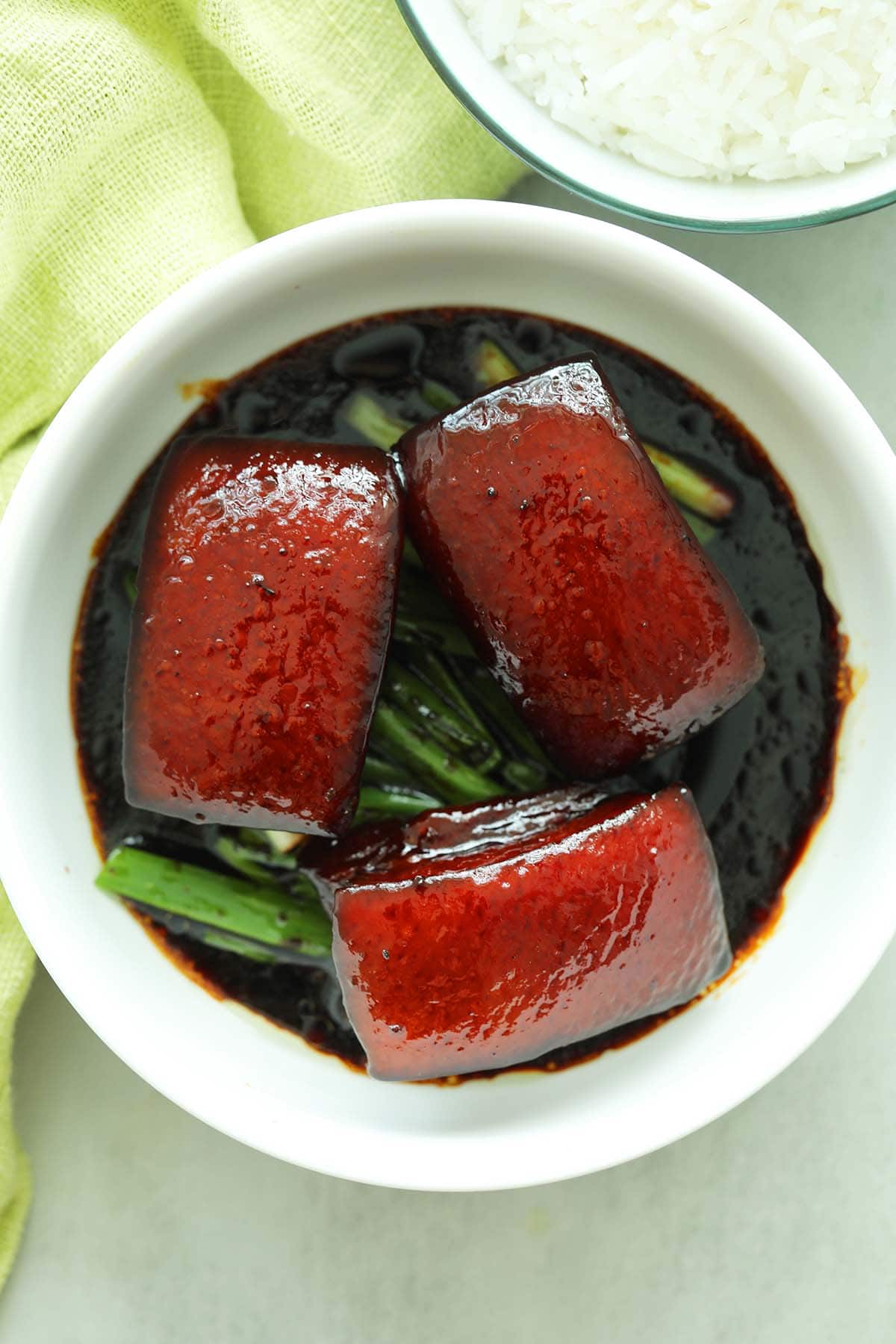
Table of Contents
- Chinese Braised Pork Belly
- Dongpo Pork
- Difference Between Dong Po Pork and Red-Cooked Pork
- Chinese Braised Pork Belly Ingredients
- How To Braise Pork Belly
- Helpful Tips For Home Cooks
- Frequently Asked Questions
- What To Serve With This Recipe
- Other Recipes You Might Like
- Braised Pork Belly (Dongpo Rou) Recipe
Chinese Braised Pork Belly
In China, pork is the most popular meat, used in many everyday and special dishes. It’s a key part of Chinese meals and traditions, showing up in everything from simple family dinners to big celebrations. The importance of pork is so deep that when people say “eat meat,” they often mean eating pork. From the smoky and delicious Chinese BBQ Pork (叉烧) and crispy Chinese roast pork (烧肉) in Cantonese cuisine to the dainty Xiao Long Bao (小笼包) from Shanghai and numerous other famous Chinese pork dishes in between, pork is clearly the meat of choice! In fact, the Chinese character for meat “肉” (ròu) always refers to pork if no particular meat is specified.
And Chinese people are especially partial to pork belly, for its rich taste, tender texture, and all its fatty glory, making it a special ingredient in many traditional dishes. Chinese cuisine also highly favors braising, especially with pork belly. It is ideal for braising because its layers of fat and meat soak up the savory sauce. The slow-cooking method also makes the pork belly tender, full of rich flavors, and literally melt in the mouth. As a result, Chinese braised pork belly dishes are favorite comfort foods in Chinese homes.
In this post, I am going to teach you all how to make Dongpo rou, or Dongpo Pork, the braised pork belly well loved by many!
Dongpo Pork
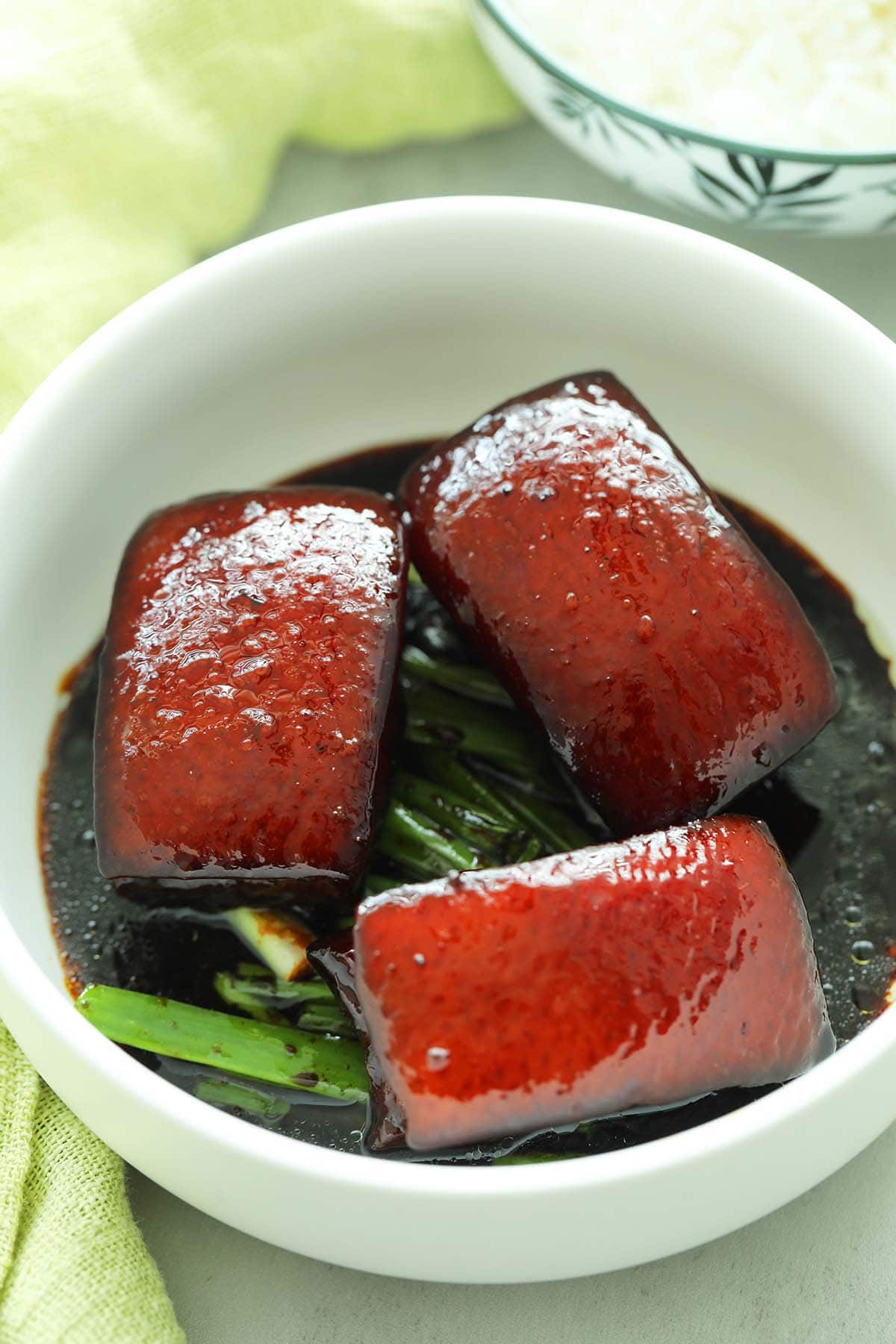
During one of my travels to China, I had the pleasure of tasting the famous Dong Po Pork (东坡肉), a beloved braised pork belly dish. Chinese cuisine often has interesting stories behind its dish names, like Beggar’s Chicken (叫化鸡), Goubuli Baozi (狗不理包子), and Dongpo Pork is no exception.
Dongpo pork is an iconic feature of Hangzhou (杭州) cuisine and can be attributed to Su Shi (苏轼) a.k.a Su Dongpo (苏东坡), a scholar and court official during the Song Dynasty (宋朝), renowned today for his brilliance in poetry, calligraphy, and writings in Chinese literary history.
There was a time when Su Dongpo was demoted for criticizing the emperor and sent to Huangzhou (黄州) in exile. One day, he was so engrossed in a game of Chinese chess (象棋) with an old friend that he forgot all about the Red-Cooked Pork Belly “Hong Shao Rou” (红烧肉) braising on his stove.
The fragrant aroma from the lengthy braising drifting in from the kitchen suddenly reminded him.
As he took a bite of the pork, he was pleasantly surprised to find that the dish he thought had been ruined turned out to be even more tender and tastier than expected.
Dongpo pork was thus born.
When he was later stationed in Hangzhou (杭州) and was overseeing a reconstruction project on the West Lake (西湖), he cooked the same dish with the pork cut up into cubes and distributed them to the workers as a sign of gratitude.
The dish was thoroughly enjoyed by all and Dong Po Rou rapidly gained popularity then and there right up to the present day, where it has become a notable signature dish in Hangzhou cuisine and famous all around the world.
Difference Between Dong Po Pork and Red-Cooked Pork
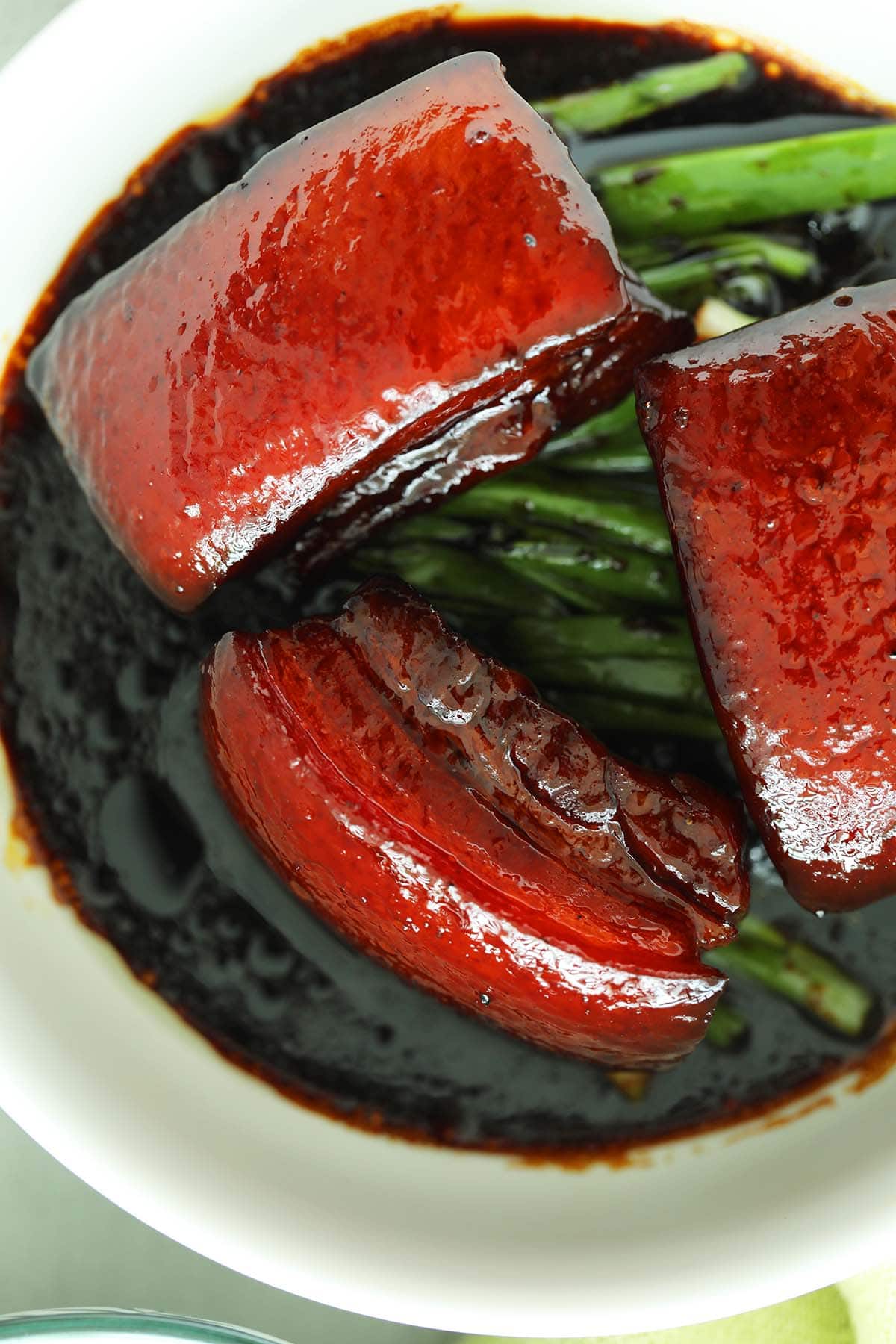
The key discerning factor between Red-Cooked Pork and Dongpo Pork is undoubtedly the lengthier braising process, which increases the caramelization of the sugar to enhance the flavor, infuses the cooking wine into the meat longer for an even richer fragrance, and last but definitely not least, breaks down the fat further to give the pork that tender “melt-in-your-mouth” texture minus the greasiness.
In other words, this is one dish that is definitely worth the wait and patience is key!
Chinese Braised Pork Belly Ingredients
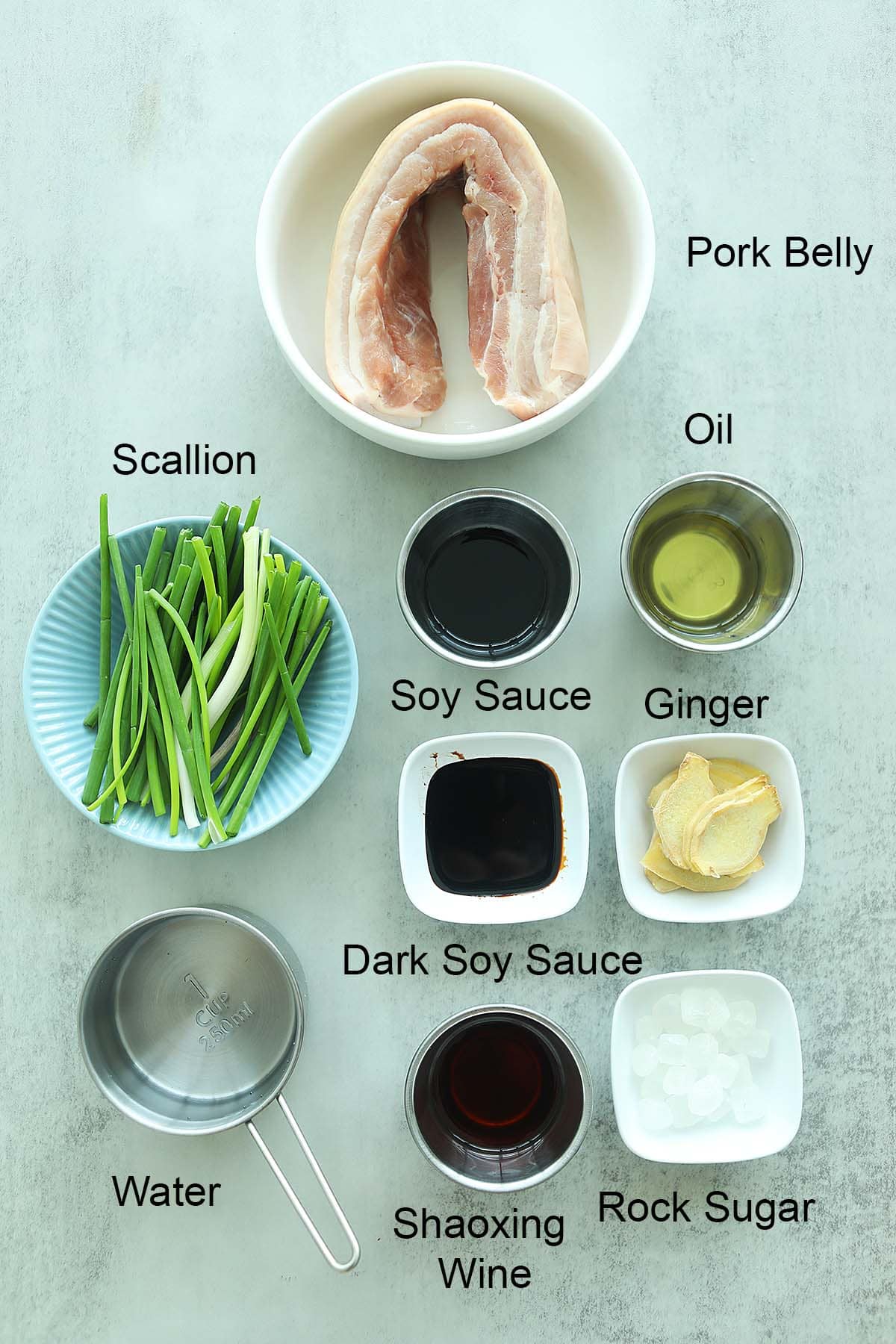
This classic braised pork belly recipe calls for the following list of ingredients.
- Pork belly – skin on pork belly.
- Ginger
- Soy sauce
- Dark soy sauce
- Shaoxing wine
- Rock sugar – this the secret ingredient that gives the glossy appearance and sweet flavor to the Dongpo Pork sauce.
- Scallion
See the recipe card for full information on ingredients.
How To Braise Pork Belly
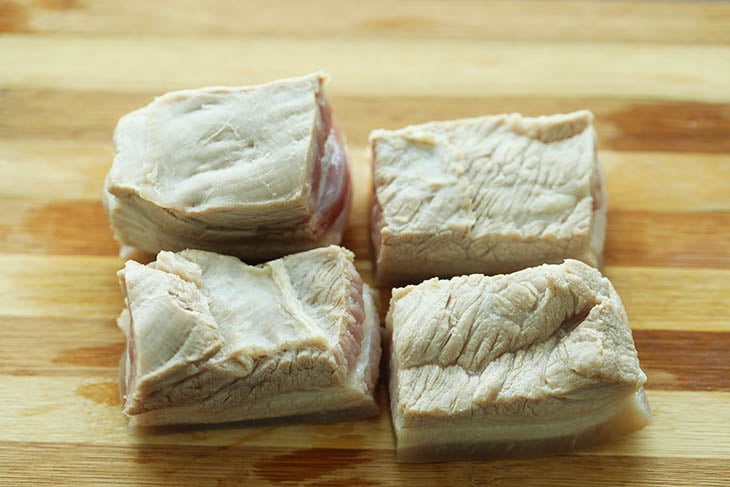
Step 1: Bring a pot of water to a boil. Add the pork belly and boil for 5 minutes. Discard the water, remove the pork from the pot, rinse it, and pat it dry. Cut the meat into 2 1/2-inch (6-cm) squares.
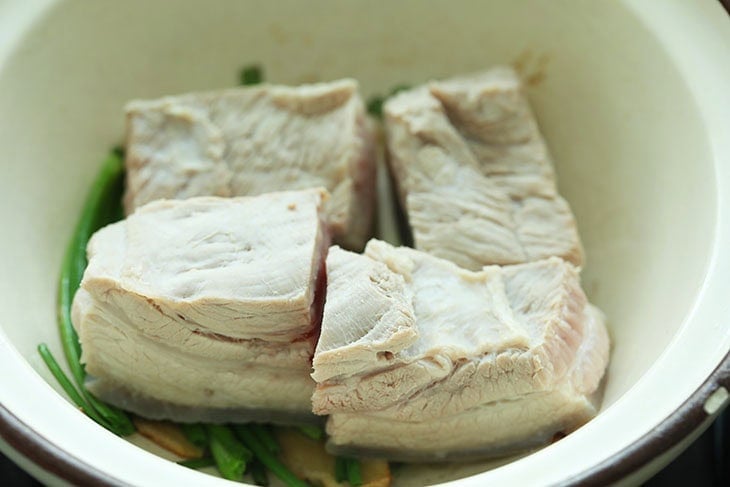
Step 2: Heat a clay pot or stainless steel pot with oil. Stir-fry the ginger and scallions until aromatic. Arrange the pork belly pieces skin side down in the pot.
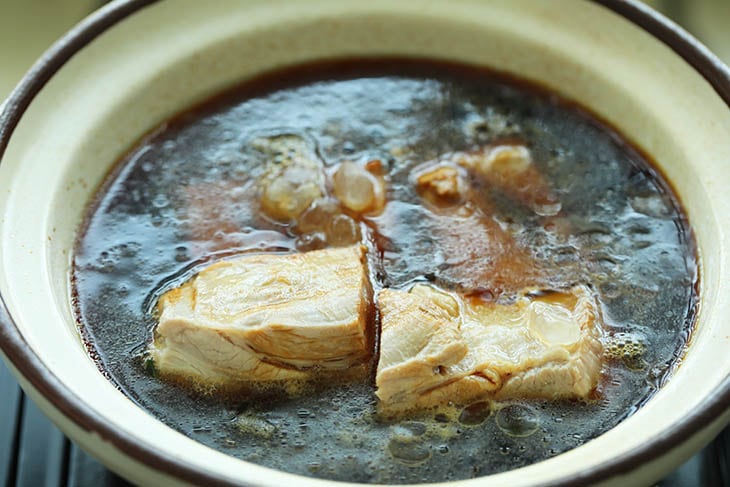
Step 3: Add light soy sauce, dark soy sauce, Shaoxing wine, rock sugar, and add adequate amount of water just to cover the pork belly (about 2 cups). Bring it to boil and cook for 5 minutes.
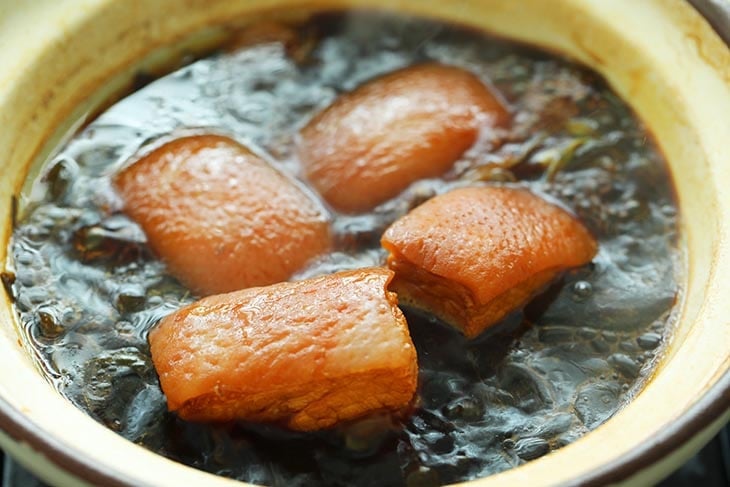
Step 4: Turn the pork belly over with the skin side up. Lower the heat to low, cover the pot with its lid, and braise for 20 minutes.
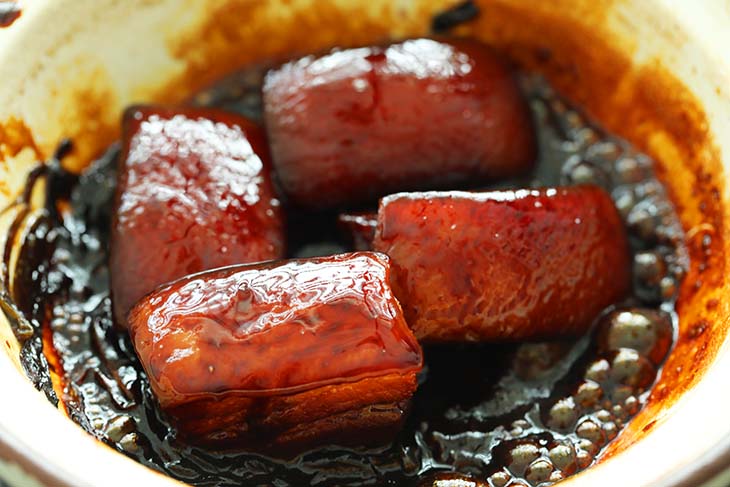
Step 5: Continue braising for about 60-80 minutes, or until the pork belly reaches your desired tenderness. Adjust seasoning with more sugar to taste, if desired. Serve immediately with steamed rice or steamed buns (mantou).
Helpful Tips For Home Cooks
Here are my insider tips for braising pork belly and making Dongpo Rou at home:
- Choose the Right Pork Belly: Use thick, even pieces with both fat and lean layers for the best texture.
- Use the Right Cookware: Using a clay pot for this recipe enhances flavor absorption and ensures even, gentle cooking, resulting in tender, flavorful pork belly with a rich, glossy sauce.
- Use Aromatic Spices: Use ginger and scallions in abundance to infuse the sauce with rich aromas.
- Be Patient: Braise the pork slowly for at least 2-3 hours to achieve the melt-in-your-mouth texture.
Frequently Asked Questions
You can use a slow cooker or Instant Pot for this recipe by changing how long you cook it and how much liquid you use.
If the braising liquid becomes too salty, you can balance it by adding a bit of water.
The pork belly is done when it becomes tender and easily pierced with a fork. The sauce should also thicken and coat the pork belly pieces nicely.
Allow the dish to cool to room temperature, then transfer it to an airtight container or sealable bag, and use within 3-4 days for the best flavor.
The leftovers can be used as a filling for baozi (steamed buns) or added to fried rice for extra flavor.
This recipe is only 376 calories per serving.
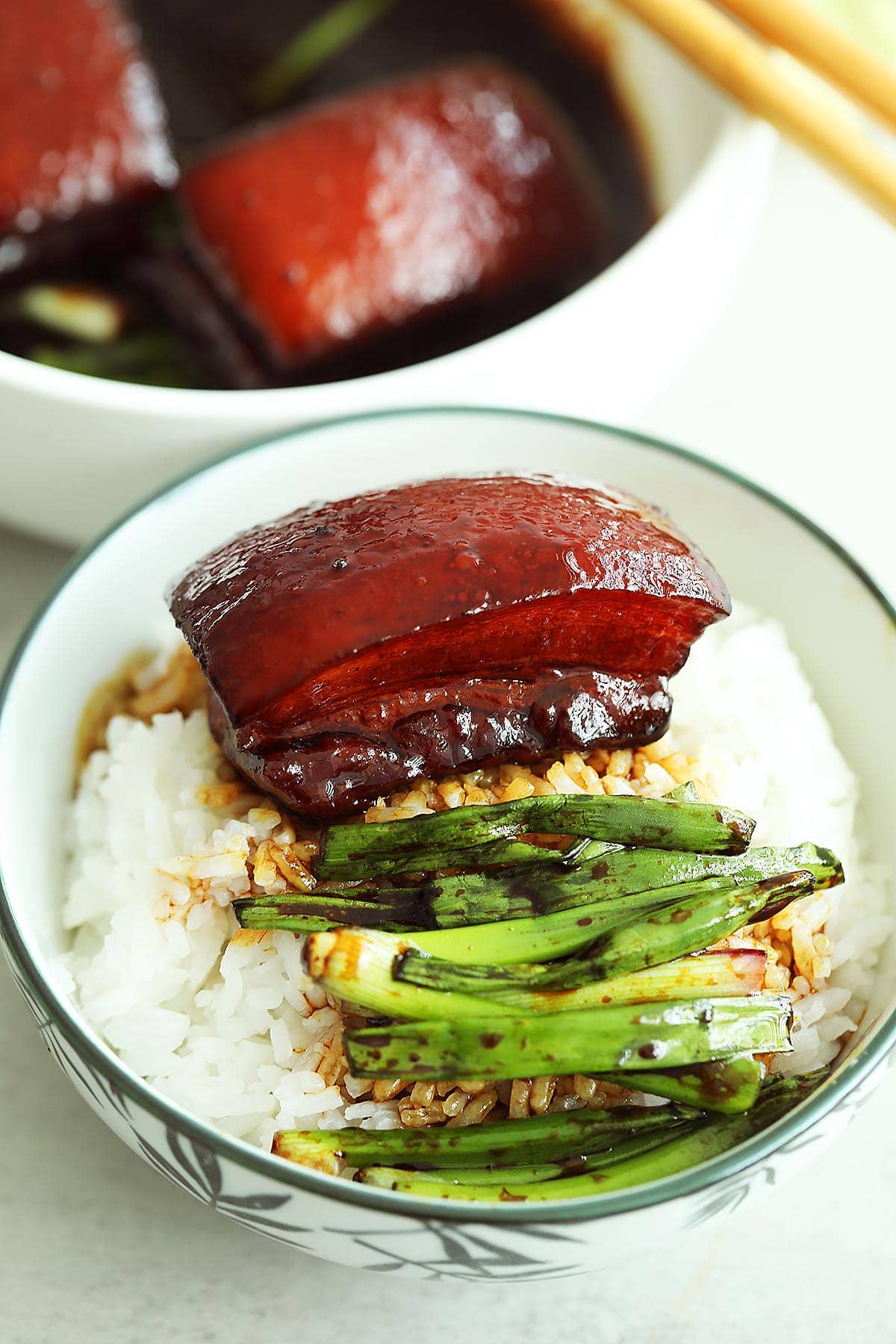
What To Serve With This Recipe
In China, a meat dish often goes with a bowl of pipping hot steamed white rice, which is the traditional way of eating. However, you can serve with a variation of carb, for examples: fried rice or shrimp fried rice.
However, my personal favorite is serving it with steamed buns (mantou) or scallion buns as I can sop up the scrumptious sauce with the fluffy buns. If you don’t like steamed buns, you can certainly serve with scallion pancakes.
For a wholesome Chinese meal, I also suggest pairing the pork with a plate of stir-fried vegetables such as: bok choy chicken or garlic bok choy. If you want to have a fancier dinner, especially if you are hosting your friends, I suggest a spread of iconic Chinese dishes below. Enjoy!
I hope you enjoy this post as much as I do. If you try my recipe, please leave a comment and consider giving it a 5-star rating. For more easy and delicious recipes, explore my Recipe Index, and stay updated by subscribing to my newsletter and following me on Facebook, Pinterest, and Instagram for new updates.
Other Recipes You Might Like
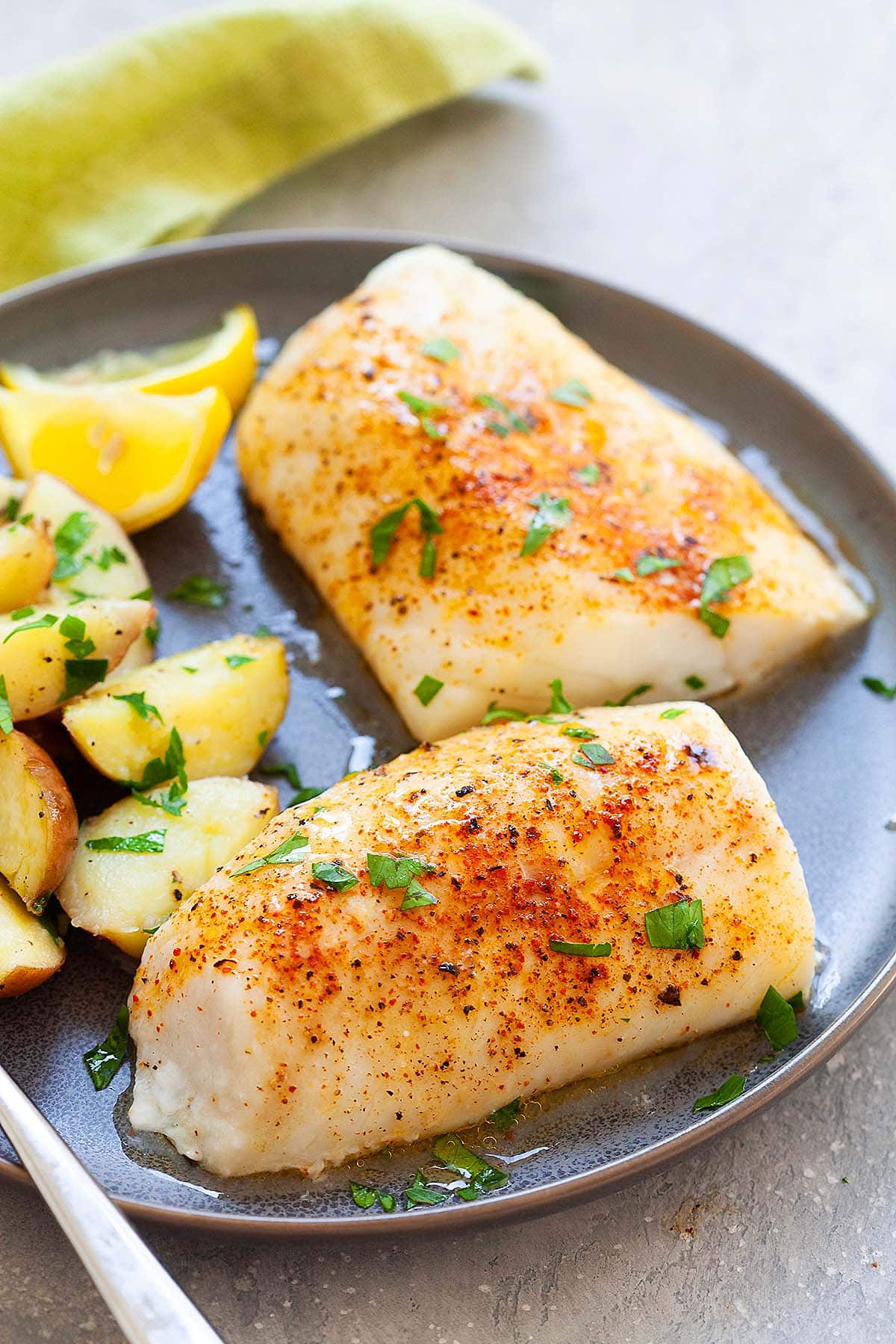
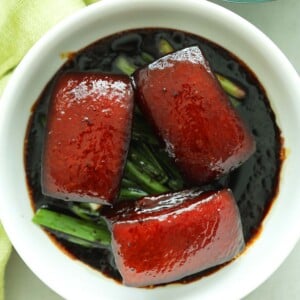
Braised Pork Belly (Dongpo Rou)
Ingredients
Equipment:
- clay pot, Dutch oven, or stainless steel pot
Ingredients:
- 1 lb (500g) pork belly
- 1 tablespoon oil
- 1- inch (2.5cm) peeled ginger, cut into 3-inch (6-cm) lengths, cut into slices
- 3 stalks scallions
- 4 tablespoons soy sauce
- 3 tablespoons dark soy sauce
- 3 ½ tablespoons Shaoxing wine
- 1 oz (30g) rock sugar, lightly crushed or 2 ½ tablespoons (40 g) brown sugar
- water, about 2 cups, enough to cover the pork belly
- sugar, to taste, optional
Instructions
- Bring a pot of water to a boil. Add the pork belly and boil for 5 minutes. Discard the water, remove the pork from the pot, rinse it, and pat it dry. Cut the meat into 2 1/2-inch (6-cm) squares.
- Heat a clay pot or stainless steel pot with oil. Stir-fry the ginger and scallions until aromatic. Arrange the pork belly pieces skin side down in the pot.
- Add light soy sauce, dark soy sauce, Shaoxing wine, rock sugar, and add adequate amount of water just to cover the pork belly (about 2 cups). Bring it to boil and cook for 5 minutes.
- Turn the pork belly over with the skin side up. Lower the heat to low, cover the pot with its lid, and braise for 20 minutes.
- Continue braising for about 60-80 minutes, or until the pork belly reaches your desired tenderness. Adjust seasoning with more sugar to taste, if desired. Serve immediately with steamed rice or steamed buns (mantou).
Video
Notes
- Choose the Right Pork Belly: Use thick, even pieces with both fat and lean layers for the best texture.
- Use the Right Cookware: Using a clay pot for this recipe enhances flavor absorption and ensures even, gentle cooking, resulting in tender, flavorful pork belly with a rich, glossy sauce.
- Use Aromatic Spices: Use ginger and scallions in abundance to infuse the sauce with rich aromas.
- Be Patient: Braise the pork slowly for at least 2-3 hours to achieve the melt-in-your-mouth texture.
Nutrition
Nutrition information is automatically calculated, so should only be used as an approximation.
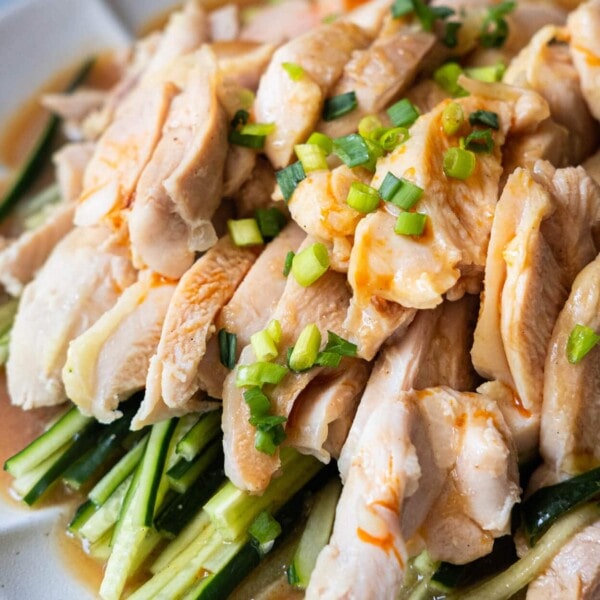
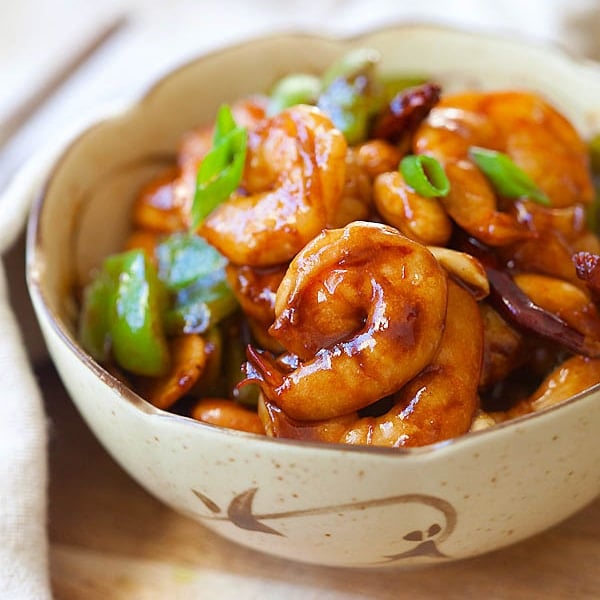
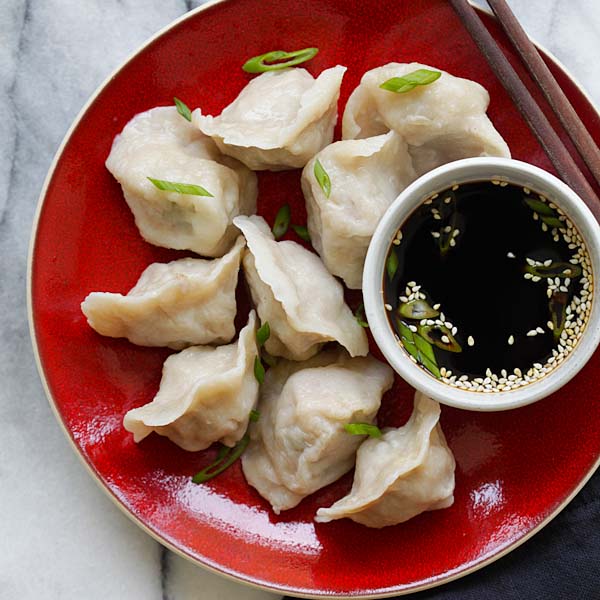
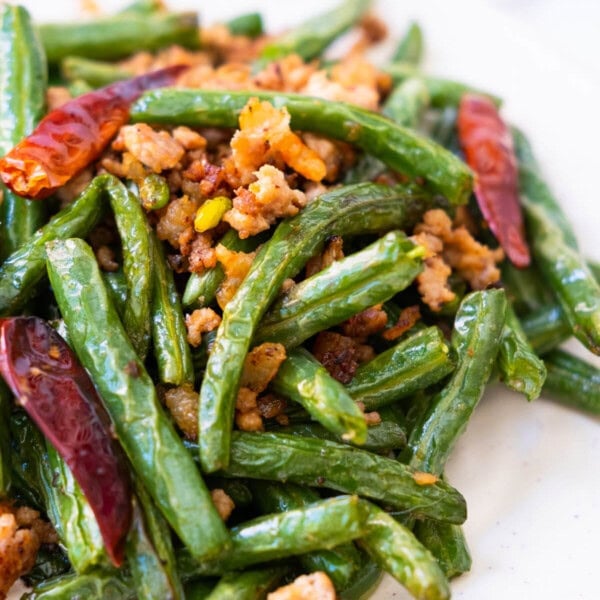






does the time at the bottom mean 11 hours or 1 to 2hours? thanks
I think it’s 1 hour and 30min/2 hours
does the time at the bottom mean 11 hours or 1 to 2hours? thanks
I came across this reference to Dong Po Rou in Chinese Gastronomy, by Hsiang Ju Lin and Tsuifeng Lin, published in 1969: “The square of fat [Tungpo pork] is regarded with much passion, tenderness, and expectation . . .People sigh, shout, and groan with happiness when they see it. This is one of the pinnacles of gastronomy, and sums
up the appreciation of fat in Chinese cuisine.” Seeking a recipe, I found your site, and just seeing a photo of the dish made me “sigh, shout, and groan with happiness.” I can’t wait to taste it! Meanwhile, I’ve ordered your book from Amazon. It’s an amazing world … at least sometimes.
this is my FAVOURITE rasa malaysia recipe hands down.
I tried it out, LOVED it. Just be watchful not to burn the pork /let it stick to the pot bottom towards the end of cooking! Best Dongpo Meat I’ve ever eaten, and I’m Chinese living in China. Lots of love!
Wow, thanks so much for trying out this recipe. :)
can cook this in a electric pressure cooker and how?
Hi, I just tred your recipe but I added sugar to the oil before stir browning the belly pieces. Does this make the pork belly ooze out a lot of fat?
By the end of braising all if the water seemed to have evaporated and it found my pork bellies braising in its out fat! Needless to the the pork still came out delicious but I didn’t get that thick caramelly gravy at the end.
I think there is a step missing from ur recipe . Do we add the pork to the pan after we stir fry the scallions and ginger? Do we brown it or immediately pour water in it?
Thanks!